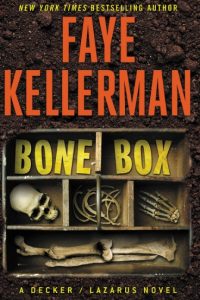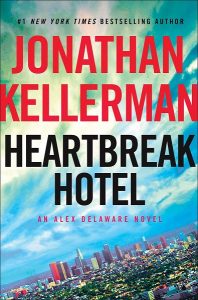Faye Kellerman is the bestselling author of 30 previous novels, most of them featuring the husband and wife team of Peter Decker and Rina Lazarus. Faye and her husband, Jonathan Kellerman, are the only married couple ever to appear on the New York Times bestseller list simultaneously for two different novels. And both are authors very long-running series.
and Rina Lazarus. Faye and her husband, Jonathan Kellerman, are the only married couple ever to appear on the New York Times bestseller list simultaneously for two different novels. And both are authors very long-running series.
Bone Box, the 28th installment of the Decker/Lazarus series, begins with Rina making a shocking discovery of bones found in the woods of her upstate New York community. It leads her husband, police detective Peter Decker, to investigate a series of gruesome unsolved murders which point to a diabolical serial killer who’s been hiding in plain sight. And whoever this psychopath is, he may be on the hunt for a fresh victim.
It’s clear from reading Bone Box that you know a good deal about forensic science. How did you learn so much?
As you know from our last talk, in my early years, I was trained as a dentist. We studied gross anatomy, which is where I got the title Bone Box. Dental students have a different experience from medical students: while medical students are given the entire body in gross anatomy, we are given parts of the body in a bone box. This is how we dentists begin learning the anatomy of the body, especially the head and neck.
As for forensic science, I ran with my basic knowledge of anatomy and medical science and talked to a few experts. I also went online—an easy and wonderful way to do research these days—and found all the forensic information I needed for the story.
Of course, over the years there have been advances in forensic science’s ability to make determinations about a very decomposed body, and all that research was available online. So, I used my basic knowledge and updated it by reading articles.
What do you feel makes Peter Decker and Rina Lazarus so appealing to the reading public?
I think they’re appealing because they’re full, fleshed-out characters.
I like that Peter is a great family man and is passionate about his work. To him, solving each crime becomes a personal mission. I like characters who care about what they’re doing and who are concerned about the victims. I think readers also like that.
I think Rena and Peter have a very good marriage, but it’s a realistic one. Sometimes they fight and I think lots of people can identify with that. She’s also a good homemaker and enjoys cooking her kugel and brisket, but contributes to Peter’s investigations whenever she feels it’s necessary to join in.
Part of why I moved them to a small town and away from Los Angeles was to allow Rena to play a larger role in the investigations. With the L.A.P.D., there was no way she could have access to the material Peter shares with her now. The L.A.P.D. is a huge, monolithic bureaucracy, but in a small town, there are fewer resources, so she can become involved.
In Bone Box, Peter Decker’s interrogation tactics are quite impressive. Have you studied interrogation techniques?
I haven’t studied interrogation techniques as a field of endeavor, but I haven seen interrogations moving away from the old concept of ‘Good Cop, Bad Cop.’
In my books, Peter and the interviewee simply talk. If you get a person talking, he or she will tell you all sorts of things. I think to be a good interrogator, you must be a very good listener. If you get guilty people talking, they will inevitably come out with a contradiction to a lie they’ve told. A good interrogator must engage in active listening, and that’s what Peter does.
Do you ever brainstorm with Jonathan for plot ideas or twists?
We don’t really brainstorm. I’ll come up with the root of an idea and I might mention it to him. Sometimes I show him a finished book. Many times, I give him the first fifty pages and ask him what he thinks.
I tend to do a lot of walking to stimulate my imagination. I love to walk and think about what might make an interesting story that will provide readers with a few hours of entertainment and relaxation.
Which question do you get asked more often than any other?
The question I’m asked most often is ‘How do you come up with ideas?’
The thing is, I never know what’s going to become an integral part of a novel, but it all derives from some part of my life experience or imagination.
I write well-fleshed out characters, and—you know this better than I do—inevitably, more ideas spring from my subconscious. They all have a little bit of me in them. It’s very hard to figure out in advance how a story will unfold, but after having written so many novels, I feel more comfortable letting the ideas come up from somewhere in my own subconscious. Writing is much easier now because that sense of panic I used to experience doesn’t set in as I begin a new book.
What moves you most in a novel?
I’m most moved by very interesting characters.
Occasionally, I’ll find a novel that’s so cleverly plotted, it grabs me; but mostly, I want to follow a person in whatever journey he or she is taking, if that character is likable and identifiable. And I try to impart that in my own novels. I always ask myself: how does the crime affect the people involved?
If you could re-experience reading one novel as though reading it for the first time, which one would it be?
Wow. That’s a tough one. [Laughter]. Leaving my husband’s books aside, and my son Jesse’s, I’ll pick Jane Eyre. It’s a very personal story of a girl who becomes a woman. I’d also say The Count of Monte Cristo, that’s a novel of world adventure and a swashbuckling account of extreme revenge.
Both books moved me as a teenager and opened my eyes to a world far beyond my very confined one.
What’s coming next from Faye Kellerman?
I have my first, standalone novel coming out some time this summer. It’s called The Killing Season and involves a seventeen-year-old boy looking for the murderer of his older sister.
Congratulations on writing Bone Box, a superb police procedural with a great deal of warmth and heart. It takes the reader into the world of detective work, forensics, marriage, medicine, murder and mystery.






